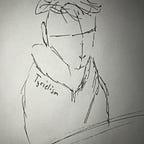Good things are great until they aren’t
Having too little is one thing, having too much is another. One is out of scarcity, the other is out of abundance. Both are bad and should be avoided.
Too little is self-explanatory: Having too little to eat can lead to malnutrition, rarely thinking about your decisions could lead to you making choices to point towards instant gratification, and putting yourself in danger too much could lead to, well… Death.
But we often overlook when we do too much.
Here are 5 examples of overdoing it.
Safetyism (Overprotection)
The idea talks about the belief of safety trumping everything else. It’s the number one priority! But when safety is taken to the extreme, it can be detrimental.
A good example is a parent overprotecting their child, depriving them of the experience of potentially getting hurt. Which will make them more fragile long-term as they don’t know what to do if they experience an injury.
Overeating
Eating more than what your body needs. This can lead to obesity and many health risks like impaired brain function. Overeating often can also mess up your hunger-related hormones (Ghrelin informing you when you’re hungry and leptin informing you when you’re full).
All because you decided to give your body too much of that good food.
Overthinking
Thinking is great, we can all agree with that. Thinking into the future is even better, imagine how much progress you’d make if you knew where you were going.
But overthinking… Now, that’s an issue. You begin to worry and paralyse yourself, what if this happens or what if this goes wrong? We get to a point where this starts to hurt us rather than help us.
Information Overload (Overlearning)
Learning is great but there is a limit. It’s like filling up a room to the brim with furniture. To the point that you can’t even get in without having to crouch or move stuff around! Very uncomfortable to say the least. And that’s exactly what we’re going to our brain when we overlearn.
We experience mental clutter and rather than being able to use the information given to us, we get overwhelmed by it and aren’t able to do anything about that.
Law of diminishing returns
We may really love to do XYZ but that thing becomes unsatisfactory after a period of time. We may be doing great work at first but after a few hours, if we keep on working, we won’t get as much done.
Here’s a great graph:
For example, like eating cake, the first one or two slices may be amazing but after the fourth or fifth, our enjoyment starts to diminish. Or when hiring more people into a team that’s already full. It may seem like a good idea but it’s probably unnecessary, adding onto the expenses without much return.
Don’t overdo things, you’re straight-up hurting yourself by having too much of a good thing. Know when to limit and follow rules like ‘Hara Hachi Bu’ which means ‘Eat until you’re 80% full’. Or if you want to be more effective when it comes to building something online or anything that is work-related, you can try out principles like the ‘80–20 rule’ where ‘80% of the results come from 20% of the action’.
Alright, hopefully, you’ve learnt something new. Have an amazing day folks!
P.S. Be sure to check out some of my other writings (And maybe consider checking out my newsletter).
Alright, thanks for reading this far, goodbye!
